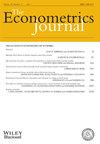Forecasting using cross-section average–augmented time series regressions
IF 7
4区 经济学
Q1 ECONOMICS
引用次数: 6
Abstract
There is a large and growing literature concerned with forecasting time series variables using factor-augmented regression models. The workhorse of this literature is a two-step approach in which the factors are first estimated by applying the principal components method to a large panel of variables, and the forecast regression is estimated conditional on the first-step factor estimates. Another stream of research that has attracted much attention is concerned with the use of cross-section averages as common factor estimates in interactive effects panel regression models. The main justification for this second development is the simplicity and good performance of the cross-section averages when compared to estimated principal component factors. In view of this, it is quite surprising that no one has yet considered the use of cross-section averages for forecasting. Indeed, given the purpose to forecast the conditional mean, the use of the cross-sectional average to estimate the factors is only natural. The present paper can be seen as a reaction to this. The purpose is to investigate the asymptotic and small-sample properties of forecasts based on cross-section average-augmented regressions. In contrast to existing studies, the investigation is carried out while allowing the number of factors to be unknown. JEL Classification: C12; C13; C33.利用截面平均增广时间序列回归进行预测
使用因子增广回归模型预测时间序列变量的文献越来越多。这篇文献的主要内容是两步方法,其中首先通过将主成分法应用于一大组变量来估计因子,并以第一步因子估计为条件来估计预测回归。另一个备受关注的研究流是在交互效应面板回归模型中使用横截面平均值作为共同因素估计。第二次开发的主要理由是,与估计的主成分因子相比,横截面平均值简单且性能良好。有鉴于此,令人惊讶的是,还没有人考虑使用横截面平均值进行预测。事实上,考虑到预测条件平均值的目的,使用横截面平均值来估计这些因素是很自然的。本论文可以看作是对此的一种反应。目的是研究基于截面平均增广回归的预测的渐近性和小样本性。与现有研究相比,调查是在允许未知因素数量的情况下进行的。JEL分类:C12;C13;C33。
本文章由计算机程序翻译,如有差异,请以英文原文为准。
求助全文
约1分钟内获得全文
求助全文
来源期刊

Econometrics Journal
管理科学-数学跨学科应用
CiteScore
4.20
自引率
5.30%
发文量
25
审稿时长
>12 weeks
期刊介绍:
The Econometrics Journal was established in 1998 by the Royal Economic Society with the aim of creating a top international field journal for the publication of econometric research with a standard of intellectual rigour and academic standing similar to those of the pre-existing top field journals in econometrics. The Econometrics Journal is committed to publishing first-class papers in macro-, micro- and financial econometrics. It is a general journal for econometric research open to all areas of econometrics, whether applied, computational, methodological or theoretical contributions.
 求助内容:
求助内容: 应助结果提醒方式:
应助结果提醒方式:


